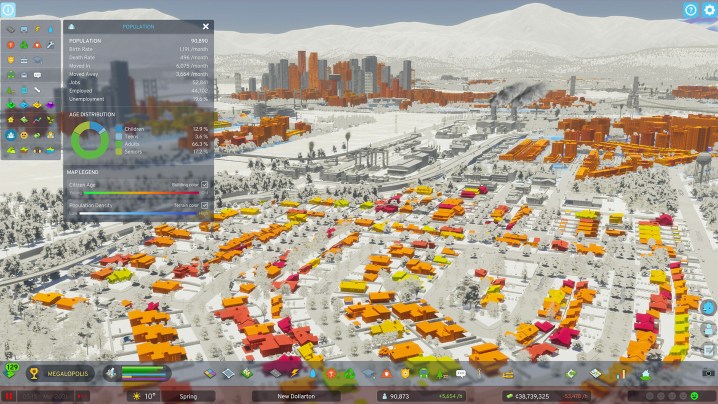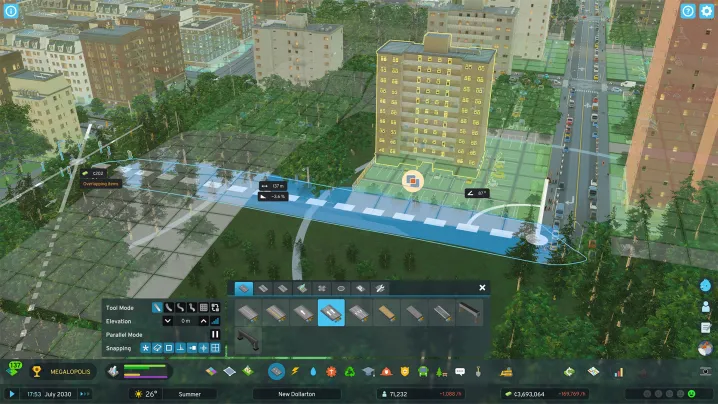Cities: Skylines was a triumphant revelation when it launched in 2015. At that point, the city-building simulation genre was reeling after a disastrous 2013 SimCity reboot, and the approachable yet comprehensive setup of Cities: Skylines made it a hit. It became more comprehensive over time with various mods and DLC that added tons of new features, like natural disasters. As such, there’s a lot of pressure on Cities: Skylines 2 to deliver, and that turns out to be a heavy task.
Cities: Skylines 2 is a comprehensive simulator, even if it feels much less revolutionary than its predecessor. If you never engaged much with the post-launch support for Cities: Skylines, you’ll get hooked by its new progression and gameplay systems that are still surprisingly approachable. More experienced players will appreciate how elements like natural disasters and other small simulations are baked into the experience from the start.
There’s a caveat to all this: Cities: Skylines 2’s developers have admitted the performance won’t be up to snuff at release, which was reflected in our playtime. While it’s a robust city-building simulator that will serve as the main DLC platform for Colossal Order and Paradox Interactive going forward, don’t feel the need to migrate from the original yet, as this sequel isn’t enough of a monumental improvement to justify wading through its technical issues just yet.
A comprehensive simulation
Cities: Skylines 2 is a thorough simulator that allows players to create massive cities piece by piece. Budding city planners need to lay down the roads, ensure the city has access to ample amounts of water and electricity, and zone certain districts and parts of the city for residential, commercial, or industrial buildings, and more. Almost any tool one would think of for a simulator like this is now present here, down to the minutiae of adjusting taxes or the fees taxis charge.

Many features added in the first game’s expansions are baked into Cities: Skylines 2, and it even comes with some new ones. The one that stands out most is improved traffic AI, which had me thinking more carefully about the flow of traffic while laying out roads. Considering Mini Motorways is one of my favorite indie games from recent years, I was overjoyed placing lots of roundabouts around my city to improve traffic flow.
Another standout reworked aspect of Cities: Skylines 2 is its clearer progression. There is a simple satisfaction in just watching a city expand, but Cities: Skylines 2 consistently rewards experience as players build roads or make their population happy. This experience contributes towards a leveling system that brings each city from a tiny village to a megalopolis. At each level, players earn skill points that can be spent on one of several progression trees to unlock new buildings.
Those unlocks contribute to the city’s growth and continual earning of experience, continuing the cycle. Recent simulators like this and Forza Motorsport have recognized that a constant feeling of progression can counteract some of the genre’s inherent tedium.
Performance problems
While that’s a strong feature set, Cities: Skylines 2 is coming out in a flawed state. Ahead of launch, Colossal Order released a forum post admitting that mod support won’t come to Cities: Skylines 2 until after launch and that “while our team has worked tirelessly to deliver the best experience possible, we have not achieved the [performance] benchmark we targeted.”

On the first pre-launch build of the game I received, I did encounter some frame rate hitching and flickering shadows, even on an Nvidia GeForce RTX 3060. Paradox recommended we play on Very Low settings to avoid most issues, which made the experience look worse than its predecessor. Earlier this week, I got a new build meant to address performance issues, and while it did improve matters a bit, it came with some distinct bugs of its own, like one where the world would disappear if I zoomed in too much.
Although this is a pre-launch build, and Paradox is already committed to consistently updating the game at and after launch, it’s tough to recommend Cities: Skylines 2 at launch in good faith without seeing what it looks like out in the wild. It seems like Cities: Skylines 2 will be in a rough state at launch, especially as it’s a vast simulator where everyone’s experience is sure to vary.

Cities: Skylines 2 obviously doesn’t have the vibrant mod support of the original at release either, so that library of fan-made content makes the stable original even more appealing if you’re looking for a city-building game to get into casually. Hardcore players will probably be the ones that get the most out of Cities: Skylines 2’s sandbox currently if they’re okay with some technical issues and leaving behind the cities they’ve spent thousands of hours on.
Under all these launch woes is a fantastic simulator on par with the original with satisfying progression. As mod support arrives and Cities: Skylines 2 receives dozens of updates and DLC packs, I do not doubt that this will become the premier citybuilder game for both casual and hardcore fans. Right now, though, it’s okay to wait until the game is a little more stable and has as vibrant a community as its predecessor.
Editors' Recommendations
- Cities: Skylines 2 devs offer DLC refunds as console ports get delayed
- This upcoming PC game brings Lego building to the real-time strategy genre
- PC compatibility for the PlayStation VR2 is being tested by Sony
- Frostpunk 2 will come to PC Game Pass when it launches this year
- Alan Wake 2 is proof that more PC games need a potato mode




